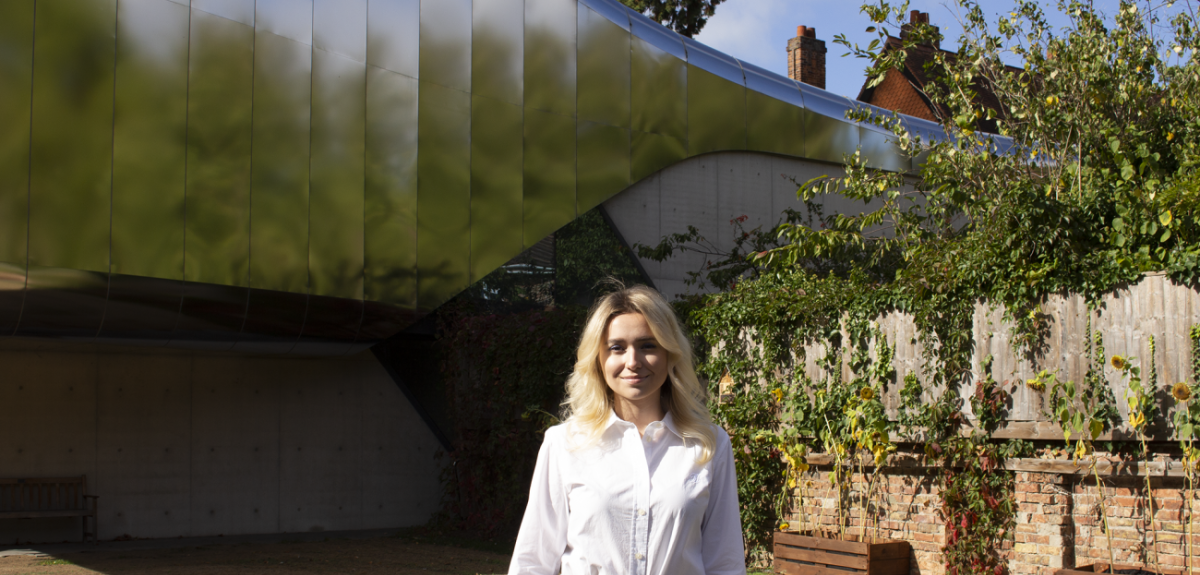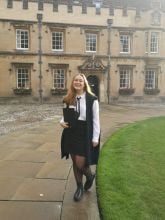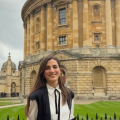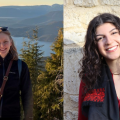
Meeting Oxford's new graduate scholars from Ukraine
The University welcomed 26 Ukraine refugees last month as part of Oxford's new Graduate Scholarship Scheme. Now a few weeks into the first term of the academic year, we've met some of those involved, including the scholars, to hear how the scheme was established and their experience at Oxford so far.
The Graduate Scholarship Scheme for Ukraine Refugees offers graduates ordinarily resident in Ukraine but displaced by the war a full-time, one-year Masters course across a broad range of subjects. The scholarship is intended to further their academic training and development to enable them to better contribute to building back Ukraine’s future.
The scholarships are co-funded by the University and participating colleges, with each scholar given free accommodation and meals within their college, and a grant of £7,500 to support their study and living costs.
Developing the scheme in record time
The scheme was spearheaded by Professor Lionel Tarassenko, President of Reuben College, whose paternal grandfather came from Eastern Ukraine and became a refugee in France between the two World Wards. Professor Tarassenko felt compelled to help, saying: ‘Like everyone else, I was horrified when the conflict started in late February, and immediately began to think about how best to help the people of Ukraine. Having been an academic in the University for the past 34 years, I had no doubt that Oxford could play its part in supporting students fleeing from the conflict.’
Yaroslava Bukhta, St John’s College – MSc Social Anthropology

Yaroslava Bukhta is studying for her Master's in Social Anthropology at St John's College.
The journey to today
Yaroslava was born and lived up until March 2022, in Kyiv, the capital of Ukraine. She did both her undergraduate degree (in Political Science) and Master's (in Journalism) in the National University of Kyiv-Mohyla Academy. Her studies during her Master's were interrupted by the full-scale Russian invasion of Ukraine in February, so she finished the last half of the year in Ukraine remotely. In addition to her academic background, Yaroslava worked in Ukrainian media for three years - mainly on projects connected to the promotion of human rights in Ukraine, democratisation, reforms and Ukrainian culture.
Empowering the Ukrainian voice
‘The full-scale war has influenced my life path a lot: I had to leave Ukraine in March, and before coming to Oxford in September I had been writing for almost half a year about the EU Agrifood policy in Brussels covering European policy. It was a great opportunity to spread information about my country and empower Ukrainian voice on the international scale (also because Ukraine is one of the world's key grains producers, with a lot of countries and people depending on Ukrainian grain exports). Raising awareness of Ukraine in the world is still one of the things that is important for me and one of the reasons I am in Oxford.’
Your Oxford experience so far
‘Oxford is an amazing concentration of bright minds from all over the world capable of making a real impact in their spheres and countries - and therefore changing the lives of millions for the better. This environment is a great challenge in many senses, but it is also a tremendous support to any initiative, idea, or aspiration you might have. This refers both to the academic and more informal parts - I feel like I have learned equally a lot from studying as well as just talking with people sharing their backgrounds. And this is just one month into Oxford!
Moreover, I appreciate the support that the University, the College and people here are providing to Ukraine, Ukrainian Scholars and me personally. My country is now fighting not only for its independence and freedom, but for true democratic values and a better future for this world. This support is extremely important and valuable.
Perhaps, the only thing I still can't adjust to is the weather - but maybe morning rowing sessions will work their magic!
Embracing student life at Oxford
Outside of her studies, Yaroslava has become part of the Oxford University Ukrainian Society, which aims to promote Ukrainian culture and intellectual heritage within the University. ‘This year the society has grown and is working on more events and opportunities for Oxford’s community to get to know more about modern and beautiful Ukraine - its rich heritage and input into global culture and intellectual potential. It is also a very welcoming and friendly community - so do not hesitate to join and follow the Society's social media so as not to miss upcoming events!’
I have also started, I think, the most "Oxford" activity - rowing. There's a lot of work ahead here, but even now I believe it is something people have to try if they want to truly feel this place. Also, waking up for the morning sessions is not that bad - it is always compensated by a great sense of the team, a lot of energy and breathtakingly beautiful mornings (almost always).
Looking to the future
‘Further to my experience in the media and perhaps not surprisingly, one of my key interests going forward is the media coverage of war. Hopefully, in the future, in addition to my research findings, I will be able to find replies to the topics I found myself writing about and coming up with very practical advice for journalists on how to make their (our) work better.’
It is also important for me to continue to work on empowering the Ukrainian voice on different levels, in particular in the academic community. Scholarships like this one offered to Ukrainians this year by the University of Oxford, combined with increased interest in research about Ukraine will be beneficial both for the many outstanding, talented people from my country getting new opportunities to realize their potential, as well as for the communities whose lives will be changed by these new discoveries.’
Anastasiia Zagoruichyk, St Antony’s College - MSc Sustainability, Enterprise and the Environment
Since leaving Kyiv University in 2020, Anastasiia has worked with NGOs, co-founded a new Ukrainian green party, covered COP26 for Ukrainska Pravda as a reporter, and written for respected climate website Carbon Brief. Her intention is clear: upon her return to Ukraine, she wants to help build a green future for her country.
Working towards a green economy
‘To do this effectively, I’ll need to understand the technical policy changes that are needed, so I can help to implement them, because although Ukraine has huge potential to be a green economy, we don’t have all the basics yet: an emissions trading system for example or some of the technical expertise. The ambition is there, but not the knowledge of how it can be achieved. That’s what I want to bring back to my country.’
Opportunities to re-build
Anastasiia’s undergraduate degree in Political Science and experience in policy communications mean she is already versed in policy design and implementation, however, the challenges she will face on her return are growing. Russia’s invasion of Ukraine has inevitably set back some of the country’s renewable energy ambitions. ‘We had about 10% of our energy from wind and solar before they invaded. Now sadly it is less, but we also have a huge opportunity to re-build our economy to be much less reliant on coal and gas.’
The journey from Ukraine to the UK
When Russia dramatically expanded its invasion this year, Anastasiia travelled from Kyiv to the UK in a harrowing 24-hour drive. ‘When I came to the UK, I was attending protests and writing articles for The Independent and Carbon Brief. Then, I saw the advert for Oxford’s scholarship on Ukrainian channels on social media. When I found out about the MSc in Sustainability, Enterprise and the Environment it seemed a great fit for me. I strongly believe that if we are to reach net zero, enterprise has to be a part of the solution.’
Some words on the future by Oxford’s Chancellor
Speaking at a reception to welcome the new scholars to Oxford earlier in the academic year, Lord Patten of Barnes, Oxford University's Chancellor, expressed his privilege of being able to share Oxford's community with them and his hopes for them to be able to return to and rebuild Ukraine after their time here.
The University and colleges are working to provide welfare support to current students who have been impacted by the conflict in Ukraine, as well as providing financial support where necessary. The University continues to support the work of the Council for At-Risk Academics (CARA) and is also an applicant to the Researchers at Risk Fellowships Programme, being delivered by the UK National Academies and in partnership with CARA, which will support researchers at risk to continue their research in the UK for up to two years.
 Student story: Finding space for Kosovo at Oxford
Student story: Finding space for Kosovo at Oxford
 Oxford students shortlisted as McCall MacBain Scholarship finalists
Oxford students shortlisted as McCall MacBain Scholarship finalists
 Student story: My time at Oxford has been deeply transformative
Student story: My time at Oxford has been deeply transformative
 Welfare blog: Dealing with imposter syndrome
Welfare blog: Dealing with imposter syndrome
 Student story: Rowing sabbatical officer
Student story: Rowing sabbatical officer